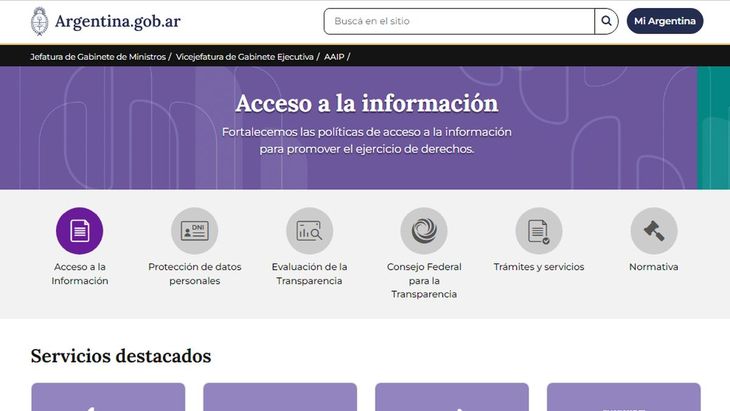The text to which Ámbito had access was drafted by the deputy Oscar Agost Carreno and bears the signatures of the president of the bench Miguel Angel Pichetto and his companions Margarita Stolbizer, Monica Fein, Francisco Morchio and Alejandra Torres. In it they point out that the regulations issued by the Executive Branch “clearly contradict and openly fail to comply with the provisions contained in Article 28 of the National Constitution.”
“The intended regulation comes to severely limit the right of access to public information reaching the absurdity of creating the figure of “abuse of the right of access to public information,” the legislators argue in the project and assure that It is a “delicate issue” due to the importance of the law of Access to Public Information in strengthening democracy.
The arguments of the project that seeks to declare the nullity of decree 780/24
The deputies do not agree with the Chief of Staff’s view. On the contrary, they assure that Milei’s decree constitutes “an illegal and arbitrary advance on the right of access to public information.”
In this regard, the project states that Law 27.275 was “a great advance” for Argentina since it allowed “any citizen, unless there are exceptions provided for in the law, to access the information required by means of a simple request that does not require justification.” The regulation represented “the product of long rounds of debate that included the participation of actors and organizations of civil society.”
They then indicate that the purpose of the regulation is to “guarantee the effective exercise of the right of access to public information, promote citizen participation and transparency in public management”, based on the principles listed in Article 1, among which transparency and maximum disclosure stand out.
4925-D-2024 ACCESS TO PUBLIC INFORMATION.pdf
In this regard, the Federal Meeting’s project that seeks to declare the nullity of decree 780/24 highlights that law 27.275 aims to enable that “all information in the possession, custody or under the control of the obliged subject must be accessible to all persons” and that it only yields “when any of the exceptions provided for in this law occur, in accordance with the needs of the democratic and republican society, proportional to the interest that justifies them.”
They also highlight the principle of “active transparency”explained in article 32, which “consolidates its spirit by ordering the Obligated subjects (provided for in article 7°) to “facilitate the search and access to public information through its official website, in a clear, structured and understandable manner for those interested and seeking to remove any barrier that hinders or impedes its reuse by third parties.”
access to info.jpg
https://www.argentina.gob.ar/aaip/accesoalainformacion
Deputies say that decree 780/24 casts “a veil of darkness” over democracy
For these reasons, the deputies of Encuentro Federal consider that The decree “constitutes a tool to limit the right of access to public information” and casts “a veil of darkness that conspires and disputes the rights that the Law it seeks to regulate enshrines and blurs the responsibility of those who are obliged to provide the information.”
For the legislators of the bloc that leads Pichetto, The right to access public information is a “substantial basis of our democracy,” along with the right to freedom of expression. “Citizen participation in the exercise of this right ensures greater levels of trust and satisfaction regarding the conduct of governments,” they point out, adding that public, private and social control “complete the framework of transparency that makes governments stronger.”
On the other hand, they denounce that the “secrecy, the opacity, the information reservation “with respect to public officials” weakens “the functioning of our democracy” and generates “a loss of social confidence in institutions.” “There can be no private information about public officials who, from the moment they make the decision to hold positions in which, among other things, they must manage public resources, are absolutely subject to control of their actions, which can no longer remain outside the eyes of society,” they say.
Finally, they assure that the decree has the claim “to curtail that access” and it is a return to the times of “opacity that we have known in the past and that was part of the transition towards an Argentina marked by the corruption and the abuses”, “This constitutes a very strong breach of our democratic consensus and calls into question the true intention behind it.”
In its Article 1, the project that became public this Wednesday and that they will seek to sanction, proposes that it be declared “Decree No. 780/24 is null and void, absolutely and irremediably null and void dated August 30, 2024 and published in the Official Gazette dated September 2, 2024, issued by the Executive Branch of the Argentine Nation “RIGHT OF ACCESS TO PUBLIC INFORMATION”.
Furthermore, Article 2 adds that those officials of the agencies included in Article 7 of Law 27,275 who do not comply with the provisions of Article 1 of this Law “will be subject to the sanctions provided for in said Law and in Article 248 of the Penal Code of the Argentine Nation.”
Decree 780/24 amending the Law on Access to Public Information
Through Decree 780/2024, published this Monday in the Official Gazette, the Executive Branch regulated Article 1 of Law No. 27,275 in what they referred to as “good faith.” In this way, it was emphasized: “The violation of the principle of good faith by all the actors involved constitutes the assumption provided for in article 10 of the Civil and Commercial Code of the Nation.”
To implement the changes, the Libertarian administration also modified the concept and scope of what is known as “public information,” stating: “Information containing private data generated, obtained, transformed, controlled or held by private individuals or legal entities or due to the absence of a committed public interest, outside the management of the obligated subjects listed in Article 7 of Law No. 27,275 and its amendment, shall not be considered public information.”
Along the same lines, they did the same with the definition of “document”. The definition of document established in Law No. 27,275 and its amendment must be understood as referring to any record that has been generated, that is controlled or that is kept within the framework of state activity. Preparatory deliberations and working papers, or the preliminary examination of a matter, will not be considered documents of a public nature,” they clarified.
Source: Ambito
I am an author and journalist who has worked in the entertainment industry for over a decade. I currently work as a news editor at a major news website, and my focus is on covering the latest trends in entertainment. I also write occasional pieces for other outlets, and have authored two books about the entertainment industry.




